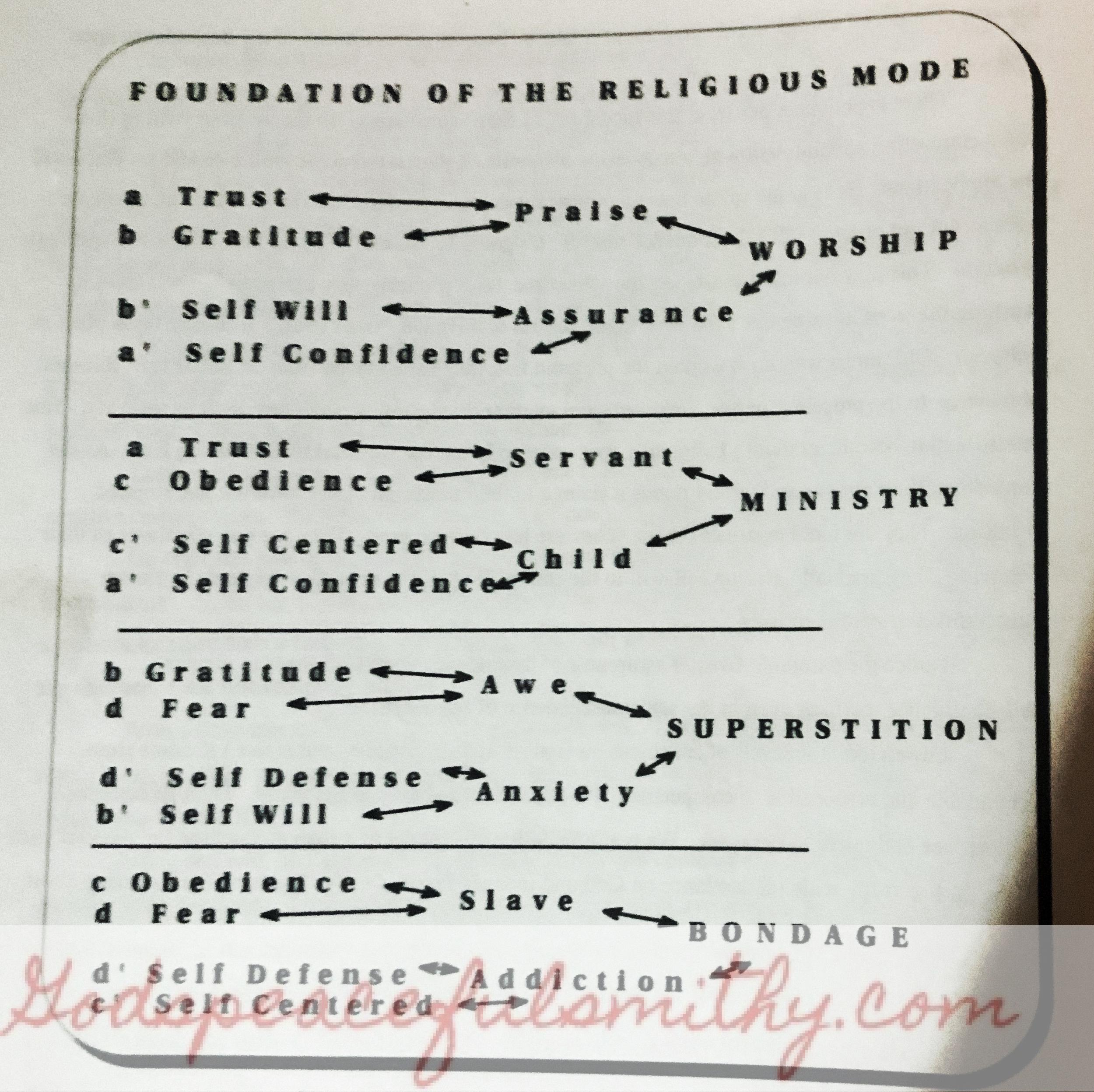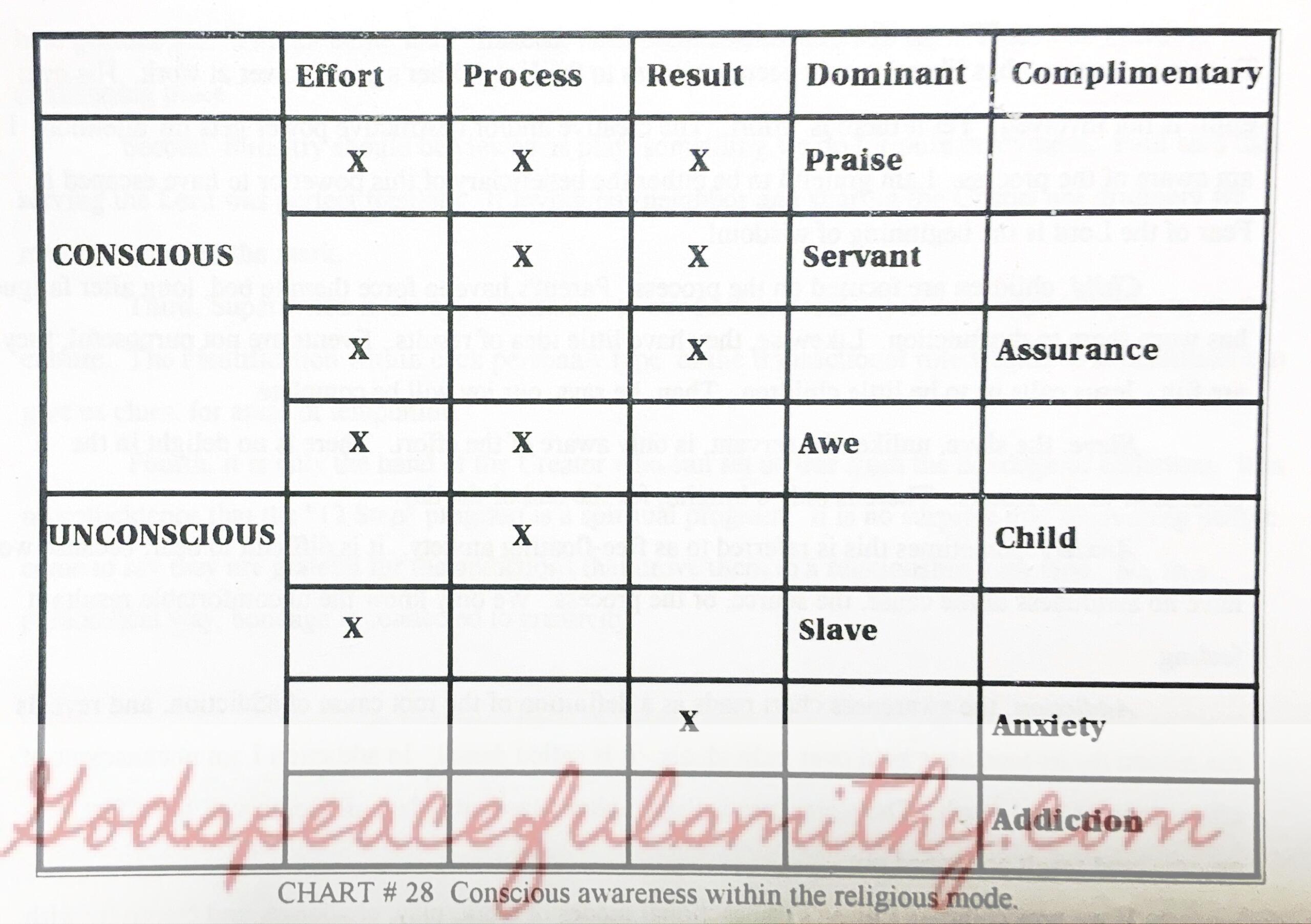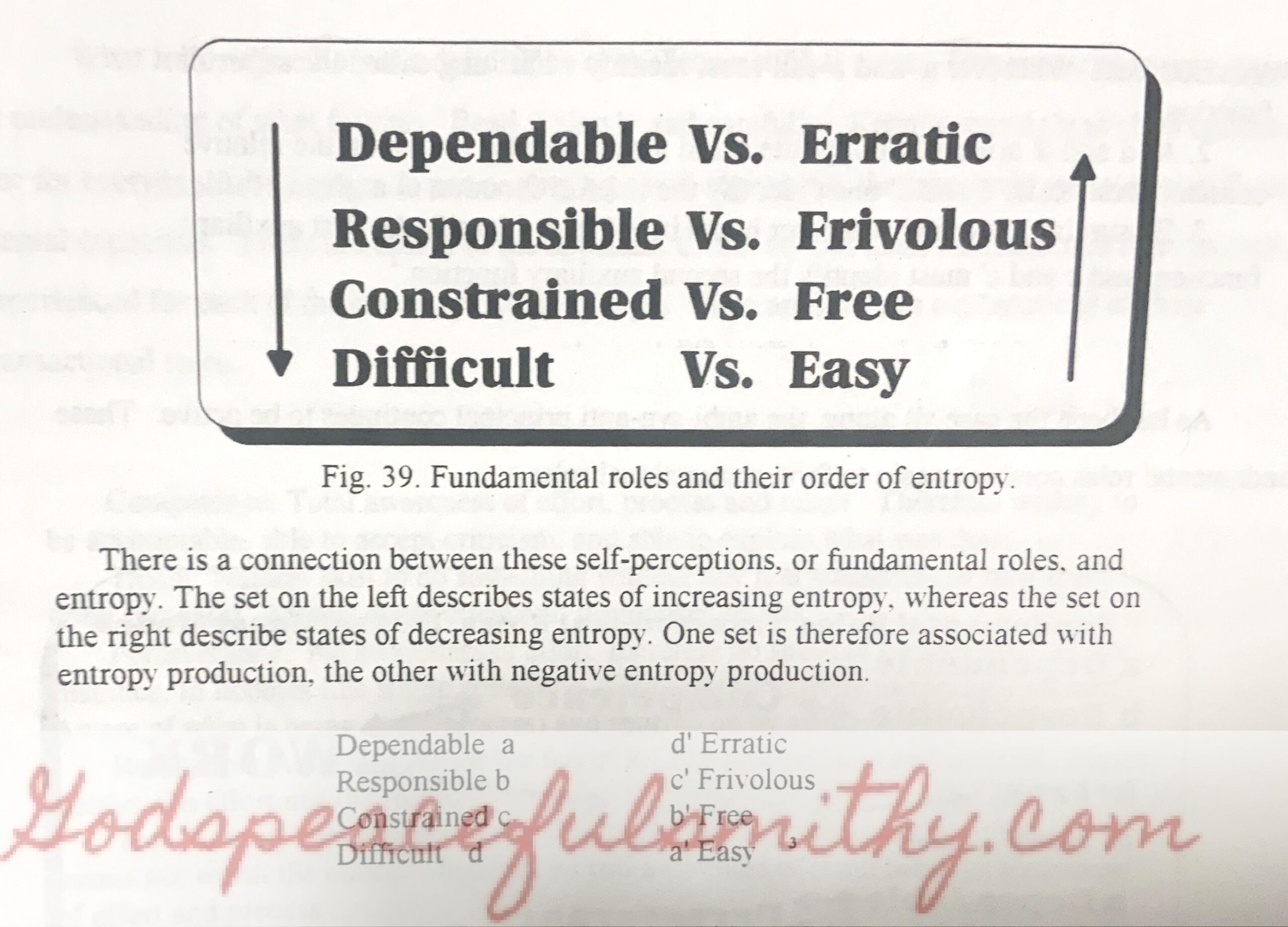Foundation of the Religious Mode is the next post in a series. It will be more understandable if you first read the first post.
Much of this material is dependent upon Lowen’s discussion of entropy.
The next step for Lowen was the levels of conscious outputs he labeled Work, Play, Challenge and Creativity. This is the source of the lowercase letters on my chart.
 In the next chart the x in a box means it is conscious. Thus, for example, when it comes to comes the activity of Praise, we are conscious of all three dimensions Effort, Process, and Result.
In the next chart the x in a box means it is conscious. Thus, for example, when it comes to comes the activity of Praise, we are conscious of all three dimensions Effort, Process, and Result.

Praise: I have defined this religious transaction as a conscious behavior. It is a combination of the two most conscious categories of dependence upon God: trust and gratitude. How does this relate to awareness of effort, process, and result? Praise is an activity that takes effort. It may be fun and enjoyable, but clapping, hands, banging symbols, and tambourines, and shouting unto the Lord take effort.
Have you ever been a spectator at a professional ball game and shared in the wave? It takes energy to stand up, raise hands high, yell, scream, and sit down. It takes even more to do it again, and again, and in time with the crowd. It takes an awareness of the process. In one of my congregations, we had a way of describing the results of praise. After a Sunday worship service full of praise, we would say, “We had church today!”
Assurance: “Blessed assurance, Jesus is mine.” Says the old hymn. It is a combination of self confidence and self will. I don’t know the mystery of the process. I only know that because I have decided to follow Jesus I am filled with peace. It takes effort to will in this way. I am aware of the result. I am self-confident, because I have come to know that I have all I need and want in Jesus.
Awe: In such events, as a birth, a death, a raging storm, or a forest fire, we witness a process. It is not one we can’t control. It is mysterious in many ways, yet it is the process we observe.
The proud father has not done the work, and made no effort, but he is aware, of the creative power of God. The storm survivor has likewise only been a witness to the Holy Other’s great power at work. His own effort is not involved. There is effort. The creative and or destructive power gets my attention. I am aware of the process. I am grateful to be either the beneficiary of this power or to have escaped it. Fear of the lord, is the beginning of wisdom!
Child: Children are focused on the process. Parents have to force them to bed, long after fatigue, has worn them to dysfunction. Likewise, they have little idea of results. Events are not purposeful, they are fun. Jesus calls us to be as little children. Then, he says, our joy will be complete.
Slave: The slave, unlike the servant, is only aware of the effort. There is no delight in the process or in the results. There is only a longing for the end of the day.
Anxiety. Sometimes this is referred to as free-floating anxiety. It is difficult to bear, because we have no awareness of the causes, the source, or the process. We only know the uncomfortable result of the feeling.
Addiction: The awareness chart reads as a definition of the root cause of addiction. It reveals the reason for its tenacious hold over individuals. It is called Denial. In addition, I am unconscious of effort, process, and result. The worst case is the drunken black out, when all memory of the effort, process, and result are wiped out.
If we now compare Lowen’s transactional modes of work, play, challenge, and creativity with the transactional modes that emerge in the relationship in the above Dichotomies, we arrive at the following religious modes: Worship, Ministry, Superstition , and Bondage.
WORK WORSHIP
PLAY MINISTRY
CHALLENGE SUPERSTITION
CREATIVITY BONDAGE
There are interesting parallels. First liturgy, that is worship, is known as the work of the people. In considering we are called to follow Jesus as little children, we might think of our ministries in the play mode. Ministry is not supposed to be toil and drudgery. It is our joy.
Often the church makes the mistake of asking people to minister in the same way that they work. For example, we get the professional teachers to run the Sunday school. This is a mistake. It’s one thing to hire a professional teacher and pay them to exercise this ministry. It’s another thing to ask someone who has already put in 40 to 60 hours of teaching to do more for the Lord, in a joyful matter! By the weekend, entropy has set in on their work mode. Better to ask them participate in their challenge or creativity modes. Then we will no longer hear the complaint “I’m not being fed”. Instead, they will say, “This is an exciting and challenging place.
Ministry should be viewed as play, something we do for pure enjoyment. Paul said that serving the Lord was perfect freedom. If loving our neighbor and sharing the gospel are drudgery, we may have missed the mark.
Superstition is always a challenge to our faith in Jesus. It is a rampant temptation in our culture. The identification, with each personality type of the transactional Moto related to superstition, can give us clues for areas of temptation.
It is only the hand of the creator who can set us free from the bondage of addiction. It is no coincidence that the 12 step programs are spiritual programs. It is no surprise that recovering people come to say that they are grateful for the addictions that drove them to a relationship with God. So, in a paradoxical way, bondage is connected to creativity.
